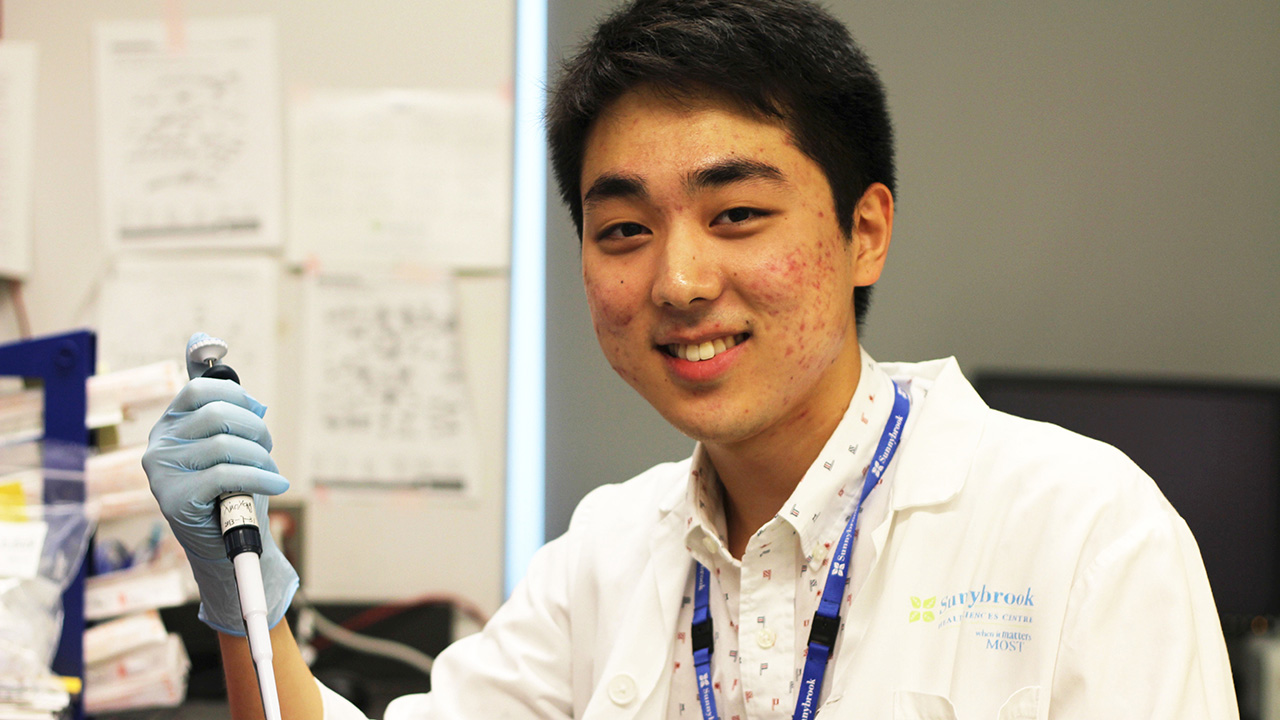Looking through a new lens
Music, photography and science don’t commonly form a trifecta of passions seen in one person. David Shin, however, is talented in all three fields.
After three summers as a volunteer at Sunnybrook, the alto saxophonist and photographer is spending this season in the lab of Dr. Stanley Liu, a scientist in the Odette Cancer Research Program at Sunnybrook Research Institute (SRI). As part of the D+H SRI Summer Student Research Program, Shin and research associate Xiaoyong Huang are studying aggressive prostate cancer cells that have survived radiation; specifically, they are targeting one mildly expressed gene. “Having a low expression of this gene seems like a bad thing, so my project is trying to figure out what the association is between this gene and cancer cell invasion. I’m trying to figure out which pathways are being affected and what the mechanisms are,” he says.
Addressing his daily work, Shin, who has completed two years in McMaster’s bachelor of health sciences program, says he is reducing the expression of the gene and monitoring the results. “So far, I’ve found that decreasing the expression of it has made these [cancer] cells more invasive, but at the same time it’s made them proliferate less.” It’s a paradoxical effect he finds fascinating, and one that keeps him on the hunt for a clear connection between the gene and increased invasion.
Securing a placement in Liu’s lab through the D+H Summer Student Research Program is a feat Shin unsuccessfully attempted last summer. He grins as he recalls emailing Liu in 2016 about a position in his lab only to learn that a student from the previous year, Michelle Meringer, would be returning to continue her research. As the 2017 application process opened, Shin immediately leapt at the chance to work with Liu, whom he calls “one of the most chill people I know,” and was delighted when he was awarded the studentship.
Although science may be his longest-standing passion—he became interested in the field when he accidentally cut his finger as a child and wanted to know why the blood eventually stopped dripping—Shin balances it with a love for music and photography. At the end of his second year at McMaster, he was elected co-president of Pops Orchestra, which is an ensemble of 20 to 30 people who casually congregate to play music, favouring songs from famous films. Shin has a particular affinity for the Pink Panther theme.
He’s also the yearbook photographer for Marmor, which is affiliated with the McMaster Students Union. For that position, he covers events from homecoming to volleyball games, and says the job helps alleviate some of the pressure associated with his schoolwork. “Photography keeps me sane. Without it, it’s just a lot of studying. The feeling I get when I’m in my room editing photos, it relieves a lot of stress.”
Science and photography may seem distinct, but Shin is quick to draw a parallel between them. He says there’s “a really similar creative approach to both” and explains how the basics form the foundation of each. Once the facts about DNA are established or photography’s rule of thirds is understood, it’s up to the researcher or photographer to infuse his or her own unique perspective, he says.
Shin is setting aside his saxophone and camera for now and keeping a steady hand on his micropipette. This is his first wet lab experience and he’s savouring it. “The most exciting part is applying what I’ve learned in class to real-life science. It’s the coolest part. I’m not referring to other people’s research. I’m making my own data and interpreting data no one has [seen] before. I’m figuring out novel information and sharing it,” he says.
The coveted connection between the gene and a rise in cancer cell invasion may evade him at the moment, but he’s confident he’ll uncover a link by the end of the summer. He says, “It’ll take a lot of work, but if I put in the effort, it’s definitely possible.”
David Shin received a D+H Summer Studentship Award.



